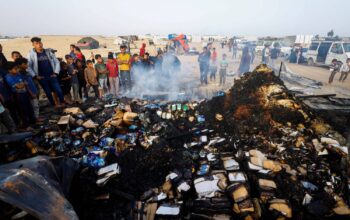ARTICLE 19 strongly condemns the use of lethal, excessive and disproportionate force, which resulted in the death of two demonstrators during clashes after erupting on the eve of the so-called ‘Sweet Beauty’ trial involving opposition leader Ousmane Sonko, accused of raping Adji Sarr, a former employee of a massage parlour.
The protest began peacefully at Ousmane Sonko’s residence but escalated into violence, with reports of some protesters being violent and throwing stones at police. Two young individuals tragically lost their lives in the cities of Dakar and Ziguinchor as a result of security officers’ use of excessive and disproportionate force against demonstrators.
No impunity for those who commit violence
All attacks on free expression in public spaces are chilling for democracy and social cohesion, whether it be acts of violence committed by citizens, or the use of excessive force by security forces, or other illegal acts by public officers.
Impunity for such acts will make it possible for authorities to step up repression and for further violence to take place – a situation that jeopardises the trust citizens must have in their public institutions. It is vital to determine what happened in the two cities in recent days and to establish strategies for safeguarding fundamental freedoms, rule of law and social cohesion in light of this information.
‘Justice and accountability are the pillars that uphold a government’s commitment to protect fundamental freedoms and preserve peace. In the face of the deadly crackdown on protesters, it is crucial that we restore conditions for a civic space where individuals can exercise their fundamental rights without fear of public restriction and repression, and refrain from using violence to express their dissent’, stated Alfred Nkuru Bulakali, Regional Director for ARTICLE 19 Senegal and West Africa.
‘These actions are crucial steps towards fostering an environment conducive to peaceful elections and the promotion of democracy. ARTICLE 19 maintains a sense of optimism that the authorities and political actors will heed these recommendations, as their implementation has the potential to alleviate the current high political tension prevailing in the country,’ Alfred Nkuru Bulakali continued.
As part of their commitment to protect people and their rights, it is imperative that authorities conduct prompt, thorough and impartial investigations and prosecute those responsible for the use of deadly, excessive and disproportionate force against protesters. All investigations must be conducted in a fair and impartial manner, holding individuals accountable for any unlawful actions. Furthermore, ARTICLE 19 calls for the provision and guarantee of the appropriate redress for the victims in the form of truth, justice and reparation.
Background
In the early hours of Monday 15 May, violence erupted between a gathering of young people and security forces in the city of Ziguinchor, a day before the scheduled trial of Ousmane Sonko, president of the political party Patriotes africains du Sénégal pour le travail, l’éthique et la fraternité (PASTEF), also known as Patriots of Senegal. ARTICLE 19 reviewed testimonies from local people, videos and photographs that show young people who gathered near Ousmane Sonko’s home fiercely resisting security forces.
Security forces, in their attempts to control the situation, responded to the violence with extreme force, including by using tear gas, grenades and other lethal weapons, according to media reports. Unfortunately, these confrontations resulted in loss of life on both sides, including two young people who died from bullet wounds and a police officer who was accidentally struck by an armoured police vehicle. One of the dead men was identified as Pape Amadou Keita, who was shot in the head in the Keur Mbaye Fall neighbourhood of Dakar. The second fatality was discovered in the Néma 2 neighbourhood of Ziguinchor but has not yet been identified. The police officer has been named as Hassime Diedhiou according to statements from the Minister of Interior, Antoine Felix Diome.
There were reports that an autopsy carried out on Pape Amadou Keita’s body by the Idrissa Pouye de Grand Yoff general hospital confirmed the allegations that lethal force was used during the protests. ARTICLE 19 was not able to confirm this information,
Sonko did not attend the trial on 16 May, and it was later postponed to 23 May.
The use of force under international law
The use of excessive force by security forces raises several legal questions pertaining to international law. Security forces have the duty to protect the lives of individuals. Both Senegal’s laws and international human rights standards and principles state that the use of force during protests should be a last resort and limited to exceptional circumstances, employed only when strictly necessary to protect life and in strict proportion to the threat of violence. Law enforcement must never use lethal force, including firearms, to disperse a protest or against protesters in an indiscriminate manner. Law enforcement officials should always exercise restraint. Moreover, the right to protest and freedom of assembly, the right to life and the right to expect prompt investigations when these rights are assaulted are all enshrined within Senegal’s laws.
It is essential that people are free to express their opinions in public, including when expressing dissent. However, it is also vital that they refrain from any form of violence, whether on public and private properties. Political actors must constantly exercise their mission under strict respect for laws. During public protest, whether spontaneous or planned, administrative officers and security forces should work together with organisers and other parties involved to provide protection, security and safety for those protesting and for members of the public who are not. The media must have access to public events and be able to report on protest without any restrictions or fear of being victims of violence, benefiting from the security of security forces and the effective collaboration of all parties involved.
Senegalese authorities must guarantee these fundamental freedoms and rights and ensure protection for all individuals. This includes creating an environment where individuals can freely express their opinions, assemble peacefully, and engage in protests without fear of reprisals or restrictions.
Source : Article19




